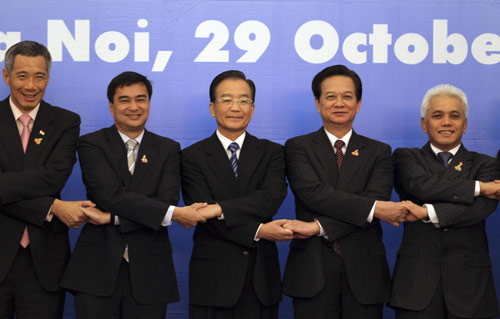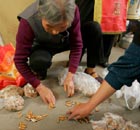Foreign and Military Affairs
Wen: China to be more active in ASEAN trade
By Qin Jize (China Daily)
Updated: 2010-10-30 07:56
 |
Large Medium Small |
 |
|
Association of Southeast Asian Nations (ASEAN) leaders join hands with China's Premier Wen Jiabao (C) for the 13th ASEAN - China Summit in Hanoi, the capital of Vietnam, Oct 29, 2010. From L-R: Singapore's Prime Minister Lee Hsien Loong, Thailand's Prime Minister Abhisit Vejjajiva, China's Premier Wen Jiabao, Vietnam's Prime Minister Nguyen Tan Dung and Indonesia's Coordinating Minister for Economic Affairs Hatta Rajasa. [Photo/Agencies] |
To do so, Wen proposed that bilateral trade be increased to $500 billion by 2015, and said China will make an effort to buy more from ASEAN countries.
"China is ready to be more active in working with ASEAN countries to build an economic and trade zone in each member state within five years," he added, in a move to encourage Chinese enterprises to invest more in ASEAN countries.
A proposal from the China Development Bank and ASEAN member country banks that a China-ASEAN Inter-bank Association be set up was signed on Friday.
Wen called this an important innovation. He said: "We should support this so it can play a full role in providing diverse financial services for economic and technical cooperation, and trade and investment."
In the first nine months of this year, bilateral trade between China and ASEAN countries amounted to $211.31 billion, a 43.7 percent increase year-on-year, with China running a $12.25 billion deficit.
Xu Ningning, the Chinese secretary-general of the China-ASEAN Business Council, in commenting on the inter-bank agreement, called it "a starting point for future progress".
Xu said: "It indicates an opening of the capital market on both sides. Financial cooperation between the two regions will grow, especially in the bond, insurance and foreign exchange markets."
Li Guanghui, head of the Chinese Academy of International Trade and Economic Cooperation's Asia-Pacific development department, said: "Following the rapid growth in bilateral trade, a further opening up and more cooperation in the financial and service sectors shows the two regions are on the right development track."
Wang Yuzhu, a Southeast Asia specialist at the Chinese Academy of Social Sciences, gave his views on the summit by saying, increased cooperation will create an atmosphere for greater trust and understanding in political and security issues.
"Premier Wen's proposals will improve this relationship and expand cooperation from the economy and to other fields," said Wang.
He said China and Southeast Asian nations should overlook differences and increase cooperation.
"Sometimes, if you leave something unsaid, it becomes a knot in the heart. But when you put it out on the table, it becomes an open scar," said Wang.
This was a veiled reference to the disputes in the South China Sea earlier this year between some Southeast Asian nations and China, meaning that it would be better to bury the disputes.
Zhou Siyu and Cheng Guangjin contributed to this story.











